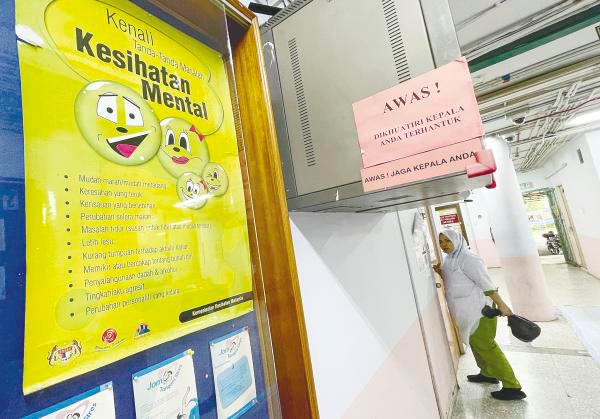PETALING JAYA: One million Malaysians over 15 years old are experiencing depression, according to the National Health and Morbidity Survey 2023, but there is a grossly inadequate number of psychiatrists to deal with the problem.
Raja Perempuan Zainab II Hospital psychiatry and mental health department head Dr Fariza Yahya said the figure has doubled from 2019, with about 50% of cases exhibiting self-harming behaviour and suicidal tendencies.
International Islamic University Malaysia psychiatrist Dr Rozanizam Zakaria said in January 2022, the World Health Organisation (WHO) estimated that more than 264 million people of all ages globally were affected by depression.
He said the organisation suggests a minimum threshold of at least one psychiatrist per 100,000 population as a basic indicator of mental health service availability.
ALSO READ: Resolving psychiatrist shortage issues
“Currently, Malaysia has about 500 psychiatrists resulting in a ratio of approximately 0.52 psychiatrists per 100,000 patients, which falls very short of what WHO recommends.”
Fariza said the hospital’s Psychiatric Specialist Clinic receives 50 new mental health cases for treatment each month, with 25 of them involving patients suffering from depression.
“The prevalence of depression is about 5% worldwide. Cases are more prevalent in major cities where there are more stressors, especially for those with financial issues, low income and poor social support.
“The most affected age group are those between 20 and 40. Even though we cannot prevent depression we can stop it from worsening by treating it as soon as possible.”
Fariza said those who seek psychiatric treatment usually have moderate to severe symptoms that have deteriorated their social functions and caused them to have suicidal thoughts, or exhibit such behaviour.
She said it is crucial to raise awareness on the severity and dangers of mental illness, as it is among the leading causes of death due to suicide.
“The stigma of having mental illness causes people to avoid seeking treatment. Malays, in particular, attribute the illness to supernatural causes or being possessed by spirits.”
She said some patients sought treatment from traditional medicine practitioners in villages, while others attempted self-treatment with illegal drugs such as pil kuda (methamphetamine).
Fariza said methamphetamine is a stimulant that may make patients feel happy for the moment, but it does not treat depression as they will return to their original state once the euphoric effect subsides.
“Males with mental illness also usually suffer from substance abuse or addiction to narcotics.
“More serious mental illness in younger age groups are usually triggered by depression, unstable family environments, traumatic events, history of abuse, relationship problems and academic pressures.”
Fariza said common factors leading to depression among middle-aged and elderly individuals are their chronic or terminal illnesses which are further compounded by marital or financial problems.
“Work-related stress is also a significant factor within the age group, while housewives often face depression due to abusive husbands or those who are drug addicts.”
Rozanizam said apart from psychiatrists, the country desperately needs a multidisciplinary team of clinical psychologists, counsellors, occupational therapists and mental health nurses.
He said such a team is critical for managing and treating mental health conditions.
However, the government also needs to implement supportive policies and provide training for various stakeholders to reduce the stigma associated with mental illness.
Rozanizam said there must be moves to promote acceptance and inclusion for all individuals facing mental health challenges, and stressed the importance of enhancing accessibility to mental health services in disadvantaged and rural areas.
He said this could be achieved through increased financial support and additional resources, with a focus on improving community mental health services and preventive programmes.
“We should encourage greater involvement of non-governmental organisations to strengthen mental health support and include resilience-building skills into the education curriculum beginning at the primary school level.”









